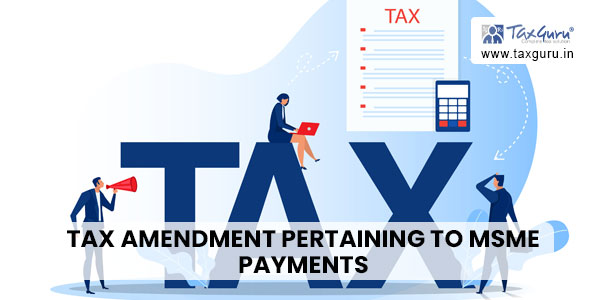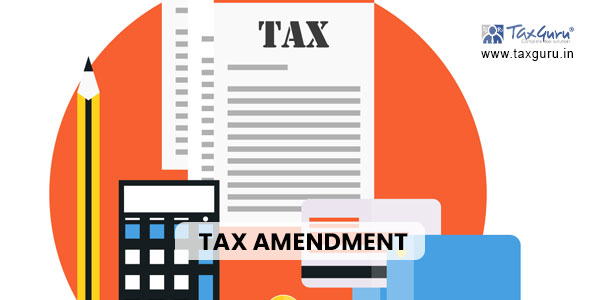Executive summary
The article contains a crisp summary on amendments introduced by Budget 2023 pertaining to MSME payments and the implications of the amendments on the commercial transactions.
Budget 2023 amendments – Promoting timely payments to Micro and Small Enterprises
1.Section 43B of the Act provides for certain deductions to be allowed only on actual payment. Further, the proviso of this section allows deduction on accrual basis, if the amount is paid by due date of furnishing of the return of income.
2.In order to promote timely payments to micro and small enterprises, it is proposed in Budget 2023 to include payments made to such enterprises within the ambit of section 43B of the Act.
Accordingly, it is proposed to insert a new clause (h) in section 43B of the Act to provide that any sum payable by the assessee to a micro or small enterprise beyond the time limit specified in section 15 of the Micro, Small and Medium Enterprises Development (MSMED) Act 2006 shall be allowed as deduction only on actual payment. However, it is also proposed that the proviso to section 43B of the Act shall not apply to such payments i.e., if the amount is paid beyond the time specified in Section 15 of the MSMED Act it is not allowed as deduction, even though the same is paid within the due date of furnishing the return of income.
3. Section 15 of the MSMED Act mandates payments to micro and small enterprises within the time as per the written agreement, which cannot be more than 45 days. If there is no such written agreement, the section mandates that the payment shall be made within 15 days. Thus, the proposed amendment to section 43B of the Act will allow the payment as deduction only on payment basis. It can be allowed on accrual basis only if the payment is within the time mandated under section 15 of the MSMED Act.
Provisions of MSMED Act – Section 15 of the MSMED Act
Liability of buyer to make payment.—Where any supplier, supplies any goods or renders any services to any buyer, the buyer shall make payment therefor on or before the date agreed upon between him and the supplier in writing OR, where there is no agreement in this behalf, before the appointed day:
“appointed day” means the day following immediately after the expiry of the period of 15 days from the day of acceptance or the day of deemed acceptance of any goods or any services by a buyer from a supplier. Explanation. —For the purposes of this clause, —
(i) “the day of acceptance” means, —
(a) the day of the actual delivery of goods or the rendering of services; or
(b) where any objection is made in writing by the buyer regarding acceptance of goods or services within 15 days from the day of the delivery of goods or the rendering of services, the day on which such objection is removed by the supplier;

(ii) “the day of deemed acceptance” means, where no objection is made in writing by the buyer regarding acceptance of goods or services within fifteen days from the day of the delivery of goods or the rendering of services, the day of the actual delivery of goods or the rendering of services;
Provided that in no case the period agreed upon between the supplier and the buyer in writing shall exceed 45 days from the day of acceptance or the day of deemed acceptance.
Implications on the company/entity:
Case 1: If there are PO terms agreed/Agreement exists between Company and MSME vendors
The credit period can’t exceed 45 days from day of acceptance or deemed acceptance. If there are any objections, they have to be communicated within 15 days from the date of delivery of goods/service whereby 45 days will be counted from the date the objections are cleared/sorted out by the vendor.
For Eg: Company issues a PO to vendor for Rs. 15,000 with pay term 45 days on 01.01.2022. Goods/Services were delivered on 10.01.2022. There were some defects and the same were communicated through an email (in writing) to vendor within 15 days i.e., say on 20.01.2022.

In the above case, 45 days will be counted from 20.01.2022. So, payment due date becomes 07.03.2022.
If the payment is not made by 07.03.2022 then entire Rs. 15,000 will be disallowed for tax computation purposes (It will be permanent disallowance). And as pe MSME regulations, Interest @ thrice the RBI rate needs to be discharged on delayed period of payment i.e., around 19-20% per annum.
Case 2: No formal agreement/arrangement exists between Company and MSME vendors
The credit period will be 15 days from day of acceptance or deemed acceptance. If there are any objections, they have to be communicated within 15 days from the date of delivery of goods/service, in which case 15 days will be counted once the objections are cleared/sorted out by the vendor.
For Eg: Vendor issues invoice for Rs. 15,000 after delivering the goods/services to company. Goods were delivered on 10.01.2022. There were some defects and the same were communicated through an email (in writing) to vendor within 15 days i.e., say on 20.01.2022.
In the above case, 15 days will be counted from 20.01.2022. So, payment due date becomes 04.02.2022.
If the payment is not made by 04.02.2022 then entire Rs. 15,000 will be disallowed for tax computation purposes (It will be permanent disallowance). And as pe MSME regulations, Interest @ thrice the RBI rate needs to be discharged on delayed period of payment i.e., around 19-20% per annum.
End note
The Government of India as part of its make in India initiative is promoting MSME sectors by introducing various measures. One such amendment was earlier brought in by bringing the reporting of delayed payments to MSME vendors through MSME-1 form and making the disclosures as part of financial statements. Now they have gone one step further to penalize the entities delaying MSME payments by way of permanent tax disallowance. Though this is a good move from the perspective of MSME sector, it will make the Multi National Companies/Large companies think about the implications before onboarding any MSME vendor as part of their vendor master.
*****
About the author : CA Gadigeppa. S. Tigadi – The author is a member of the Institute of Chartered Accountants of India and also an IBBI registered valuer and an Insolvency Professional. He can be reached at cags@tigadi.in or cagstigadi@gmail.com.





What happens if the invoice is raised on 17th March and payment is mad within 15 days on 1st Apr and cheque bounces will this be considered as timely payment.